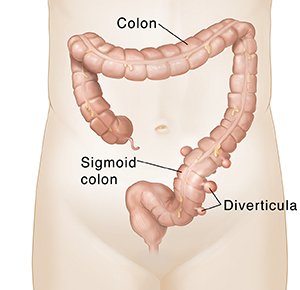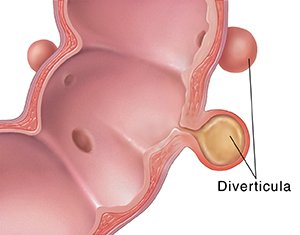Understanding Diverticulitis and Diverticulosis
The colon (large intestine) is the last part of the digestive tract. It absorbs water from stool and changes it from a liquid to a solid. In certain cases, small pouches called diverticula can form in the colon wall. This condition is called diverticulosis . It’s very common as people get older. The pouches can become infected. If this happens, it becomes a more serious problem called diverticulitis . These problems can be painful. But they can be managed.

Pouches or diverticula usually occur in the lower part of the colon called the sigmoid.

Diverticulitis occurs when the pouches become infected or inflamed.
Managing your condition
Diet changes or medicines may be prescribed.
If you have diverticulosis
Recommendations include:
- Diet changes are often enough to control symptoms. The main changes are adding fiber (roughage) and drinking more water. Fiber absorbs water as it travels through your colon. This helps your stool stay soft and move smoothly. Water helps this process.
- If needed, you may be told to take over-the-counter stool softeners.
- To help ease pain, antispasmodic medicines may be prescribed.
- Watch for changes in your bowel movements. Tell your healthcare provider if you notice any changes.
- Begin an exercise program. Ask your healthcare provider how to get started.
- Get plenty of rest and sleep.
If you have diverticulitis
Treatment depends on how bad your symptoms are.
- For mild symptoms. You may be put on a liquid diet for a short time. Antibiotics are usually prescribed. If these 2 steps relieve your symptoms, you may then be prescribed a high-fiber diet. If you still have symptoms, your healthcare provider will discuss more treatment choices with you.
- For severe symptoms. You may need to be admitted to the hospital. There, you can be given IV antibiotics and fluids. You will also be put on a low-fiber or liquid diet. Although not common, surgery is needed in some people with severe symptoms.
Keys to colon health
Help keep your colon healthy with a diet that includes plenty of high-fiber fruits, vegetables, and whole grains. Drink plenty of liquids like water and juice. Maintain a healthy lifestyle, including regular exercise, stress management, and adequate rest and sleep.
For more information or to schedule an appointment, call:
| SBL Evergreen Clinic 1104 West Evergreen Ave. Effingham, IL 62401 217 347-2500 |
SBL Surgery Clinic 1000 Health Center Dr., Suite 101 Mattoon, IL 61938 217 258-4020 |
